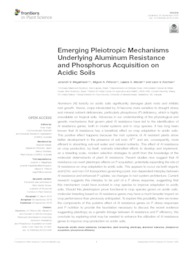Emerging pleiotropic mechanisms underlying aluminum resistance and phosphorus acquisition on acidic soils.
Emerging pleiotropic mechanisms underlying aluminum resistance and phosphorus acquisition on acidic soils.
Autoria: MAGALHAES, J. V. de; PIÑEROS, M. A.; MACIEL, L. S.; KOCHIAN, L. V.
Resumo: Aluminum (Al) toxicity on acidic soils significantly damages plant roots and inhibits root growth. Hence, crops intoxicated by Al become more sensitive to drought stress and mineral nutrient deficiencies, particularly phosphorus (P) deficiency, which is highly unavailable on tropical soils. Advances in our understanding of the physiological and genetic mechanisms that govern plant Al resistance have led to the identification of Al resistance genes, both in model systems and in crop species. It has long been known that Al resistance has a beneficial effect on crop adaptation to acidic soils. This positive effect happens because the root systems of Al resistant plants show better development in the presence of soil ionic Al3C and are, consequently, more efficient in absorbing sub-soil water and mineral nutrients. This effect of Al resistance on crop production, by itself, warrants intensified efforts to develop and implement, on a breeding scale, modern selection strategies to profit from the knowledge of the molecular determinants of plant Al resistance. Recent studies now suggest that Al resistance can exert pleiotropic effects on P acquisition, potentially expanding the role of Al resistance on crop adaptation to acidic soils. This appears to occur via both organic acid (OA)- and non-OA transporters governing a joint, iron-dependent interplay between Al resistance and enhanced P uptake, via changes in root system architecture. Current research suggests this interplay to be part of a P stress response, suggesting that this mechanism could have evolved in crop species to improve adaptation to acidic soils. Should this pleiotropism prove functional in crop species grown on acidic soils, molecular breeding based on Al resistance genes may have a much broader impact on crop performance than previously anticipated. To explore this possibility, here we review the components of this putative effect of Al resistance genes on P stress responses and P nutrition to provide the foundation necessary to discuss the recent evidence suggesting pleiotropy as a genetic linkage between Al resistance and P efficiency. We conclude by exploring what may be needed to enhance the utilization of Al resistance genes to improve crop production on acidic soils.
Ano de publicação: 2018
Tipo de publicação: Artigo de periódico
Unidade: Embrapa Milho e Sorgo
Palavras-chave: Alumínio, Fósforo, Melhoramento Vegetal
Observações
1 - Por padrão são exibidas publicações dos últimos 20 anos. Para encontrar publicações mais antigas, configure o filtro ano de publicação, colocando o ano a partir do qual você deseja encontrar publicações. O filtro está na coluna da esquerda na busca acima.
2 - Para ler algumas publicações da Embrapa (apenas as que estão em formato ePub), é necessário ter, no celular ou computador, um desses softwares gratuitos. Sistemas Android: Google Play Livros; IOS: iBooks; Windows e Linux: software Calibre.
Acesse outras publicações
Acesse a Base de Dados da Pesquisa Agropecuária (BDPA) para consultar o acervo completo das bibliotecas da Embrapa.

